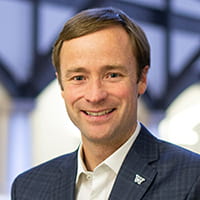Photo above: The main railway station in Helsinki, Finland by Juha Uitto / Flickr via CC BY-NC 2.0
CIP continues work to foster educational ties with Finnish peers around efforts to improve information literacy skills.
The challenges we face navigating mis- and disinformation online and in our lives around us are far from unique here in the United States. While much of our work at the University of Washington’s Center for an Informed Public is focused domestically, we recognize that the dynamics and impacts of rumors, mis- and disinformation are not bound by international borders.
In recent months, the CIP has been working to foster stronger educational ties with peers in Finland, a nation that has a long history of facing disinformation campaigns.
“There’s so much we can learn from Finland. They’re global leaders and have experience dealing with disinformation campaigns for many years,” said CIP co-founder Jevin West, a UW iSchool associate professor who studies data science, the science of science and misinformation and is helping to lead foster educational ties and partnership with peers in Finland, which plans to join NATO.
In 2021, Washington state officials signed a Memorandum of Understanding with the government of Finland to support stronger economic ties. Last year, the CIP received funding in the 2022 Washington state supplemental budget to build deeper ties with researchers, educators and librarians in Finland working in the areas of misinformation, disinformation, and media literacy. This work falls within the fifth area of the state’s MOU — new technologies changing ways how societies interact. Finland has faced disinformation campaigns throughout its history and with its movement into NATO, these issues will be even more pertinent in the years to come.
 During a September 2022 visit to Finland, West was focused on building research and educational ties with scholars and teachers in Finland who work on mis- and disinformation and media literacy. In addition to visiting the U.S. Embassy in Helsinki with Washington Gov. Jay Inslee, State Sen. Marko Liias, and various leaders from across Washington, West also met with researchers and educators at the University of Helsinki, within the Finnish government, and at Centers of European Excellence focused on threats to national security such as mis- and disinformation.
During a September 2022 visit to Finland, West was focused on building research and educational ties with scholars and teachers in Finland who work on mis- and disinformation and media literacy. In addition to visiting the U.S. Embassy in Helsinki with Washington Gov. Jay Inslee, State Sen. Marko Liias, and various leaders from across Washington, West also met with researchers and educators at the University of Helsinki, within the Finnish government, and at Centers of European Excellence focused on threats to national security such as mis- and disinformation.
In 2023, West has continued this work and will be giving research talks at Finnish organizations and coordinating lab exchanges with Finnish researchers. The CIP is also planning to incorporate Finnish programs around media literacy into current programming and resources.
The goal, overall, is to share research methods, teaching programs and ideas for addressing these challenges. In a Q&A, West expands upon the CIP’s collaborations with Finnish peers, where this work is going, and what we can learn from Finland.
What can educators in the United States learn from counterparts in Finland about how to improve the ways we teach information literacy skills and being more resilient to mis- and disinformation?
West: Finland is a world leader in education. The Organization for Economic Cooperation and Development and the Program for International Student Assessment assess reading, writing and math skills across the world. Finland regularly rises to the top. But it is not just standard skills where they succeed, they also rank at the top of 41 European countries in their resilience to misinformation, according to the Open Society Institute. This is likely a reflection of their unique approach to education where critical thinking is prioritized above standardized tests, but the success is also likely due to the early development of media literacy skills starting in pre-school and the integration of these skills across all subjects — from math to the social sciences. Finland shows us that media literacy shouldn’t be taught in isolation. In the U.S., schools are lucky to have a class or special seminar with older students where media literacy and digital civics is the focus. We need to change that and integrate media literacy skills earlier and across our national curriculum.
While teaching and improving media literacy and information skills are important, we know they’re not enough since mis- and disinformation present whole-of-society challenges. Do you think Finland approaches these challenges in different ways that we do in the United States?
West: Finland doesn’t wait until high school to talk about “fake news.” They talk about in pre-school and upwards. They talk about it in health classes; they talk about it in writing classes, etc. In Finland, teachers are highly respected and are given a lot of latitude in how they teach students. There is less focus on standardized tests and teacher evaluation. This allows teachers to customize their learning environment to the students they are teaching. They can have an open discussion about a news headline in the papers that day. They can then follow its sources and critically assess its validity as a group. This kind of activity is difficult to standardize and assess, which makes it harder to incorporate into our course planning. It doesn’t mean that we don’t see this in our classrooms; it is just harder to incorporate into an already full, sometimes rigid curriculum.
Finland also has the advantage of speaking a unique, difficult language. Finnish is mostly only spoken by native speakers so when outsiders try to fabricate news, natives are able to identify syntactic problems easier than with broadly spoken languages like English. This may change, though, as AI chatbots become more prevalent and effective at translation, even with difficult languages like Finnish.
What are some ways educational leaders in Finland are working with the Finnish government to address mis- and disinformation?
West: Finland is quite distinct from the U.S., and much of the world, in their view of teachers, journalists and government. As I noted previously, teachers are highly respected. Journalists, for the most part, are trusted. Even the government is trusted, at least far more than in the U.S. This creates an opportunity for educators to work with the government to design curriculum or given the latitude by government to address this challenge as teachers see fit. I had the chance to speak with government leaders while in Finland. I was amazed at how collaborative government officials were with educators. There was a mutual trust that allowed for education innovation and quick adaptation. The U.S. is much larger than Finland, and the education system is different, but given the importance of training our citizenry to be resilient to the increasing onslaught of misinformation, we should work to become more collaborative across agencies and institutions on this topic of media literacy, as they seem to be in Finland.
How do you think the CIP’s work will benefit from this ongoing educational exchange with Finland? Where is this work going?
West: One of our major goals in the CIP is to translate our research into education tools and programs. We can learn a lot from Finland on how they teach media literacy to people from age 9 to 99. They have programs that have been time tested and evaluated. We can build on these programs and incorporate many of them into our programs, such as MisinfoDay — our statewide collaboration co-led by UW and Washington State University. Here at UW Seattle, we also have a strong program in Scandinavian Studies that we hope to leverage in this collaboration. Our hope, though, is to make this a two-way exchange. We have substantial expertise on the research side of misinformation, and our hope is to make this research available and translatable to educators. We plan to have lab exchanges with researchers and educators in Finland around the topic of misinformation and media literacy as an intervention to misinformation.
Much of the Center for an Informed Public’s work is focused on the United States, but the CIP has researchers whose work looks beyond our borders. What are some of the other aspects of the CIP’s international work?
Misinformation is not a U.S. problem. It is a world problem that sees no borders. At the CIP, there is growing international work and collaboration in addition to our work with Finland. For example, our misinformation escape room gaming work, developed in recent years through a great partnership across research centers at the UW iSchool, has been adapted and localized for use in Latvia and New Zealand. We have faculty members with expertise in Azerbaijan, Russia and elsewhere in the post-Soviet region. We’ve hosted scholars and others with subject matter expertise in places like Brazil, where mis- and disinformation around elections has been a major concern, but also Mali and the Central African Republic. We also have PhDs and postdocs collaborating on research studying how misinformation spreads in Vietnamese diasporic communities in the U.S. and others collaborating with researchers in Kenya and South Africa who are studying trust in information about elections. Our work in Finland helps add to that strong international foundation for our work at the CIP.



